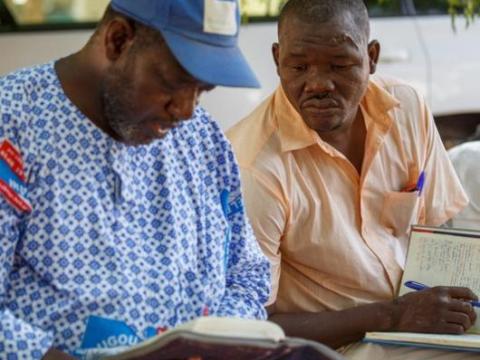
Our work is not done – stigma and HIV still go hand in hand
By Rev Christo Greyling
As a person of faith, and more particularly, as a person of faith who has been living with HIV for 35 years, I am someone who has witnessed the incredible role faith actors have played and will play to get us to Zero HIV-related Stigma and Discrimination. But I also know why our work is not done.
We all know that to overcome the barriers to HIV prevention, treatment, and care, we must build bridges of collaboration, reaching out to those who do not always share our ideas and way of working.
Those among us living with HIV know too well that stigma and discrimination form some of the most significant barriers to HIV prevention, testing, treatment, care, and support.
They weaken the ability of individuals and communities to protect themselves from HIV and to stay healthy, if they are living with HIV.
Sadly, faith has often been used as an excuse to stigmatise and discriminate – I know too many people who have faced stigma and discrimination by a faith leader or institution. This is not acceptable! We can and must stop this.
Faith traditions share the belief in the inherent dignity and value of each human being, a dedication to end injustice, and a commitment to care for the most vulnerable and marginalised in society. These principles, together with equipped and empowered faith leaders and faith communities, are essential to address stigma and discrimination and allow us to achieve the HIV outcomes we dream of.
I want you to know that several faith groups are working together to create this positive faith in action.
Faith leaders, faith-based organisations and people of faith contribute meaningfully to various aspects of the HIV response: providing services to the most marginalised such as irregular migrants; using places of worship to create demand for HIV services; addressing myths and misinformation; preaching sermons to tackle stigma and discrimination; or raising awareness of HIV.
Stigma poses particular challenges to many children and adolescents living with HIV around the world. Babies may become HIV+ because their mothers fear judgment and do not seek prevention of vertical transmission services; parents and caregivers do not bring their children for HIV testing; and many adolescents in boarding schools drop out of treatment to avoid being judged.
We also know that discriminatory laws, policies, and practices against people living with HIV are both a consequence and a cause of stigma and discrimination.
As faith communities, we believe that stigma, discrimination, unjust and unfair laws, policies and practices, and human rights violations against people living with or vulnerable to HIV threatens the progress we want to see.
For an effective HIV response, we must address structural and social barriers. It is therefore essential that the UN Political Declaration commits to the following:
- Urgent measures to eliminate harmful laws, policies, and practices. This includes how we criminalise HIV transmission, travel restrictions, mandatory testing, and measures blocking access to services for key groups of people.
- Support for multi-stakeholder partnerships including faith actors. This is essential to understand and address all factors that contribute to the spread of HIV and reinforce social injustices.
- Investment in interventions to reduce stigma and discrimination, such as the Framework for Dialogue between religious leaders and networks of people living with HIV, the Stigma Index, and other promising practices.
I believe that faith communities have a moral responsibility. A responsibility to support legal and social environments that advance human rights, gender equality, social justice goals, and successful strategies for HIV prevention, testing, treatment, care, and support. And we are already doing so.
As Archbishop Desmond Tutu said:
“We are the agents of transformation, capable of turning the tide against the disease. We must recognise our interconnection, regardless of geographical, cultural or religious constructs. . .We must respect each other. . . We must stand shoulder to shoulder, heart to heart in the fight against HIV and AIDS.”
Christo is the original architect of the world-leading Channels of Hope approach, and is World Vision’s Senior Director for Church Partnerships. Follow Christo on Twitter @christogreyling
